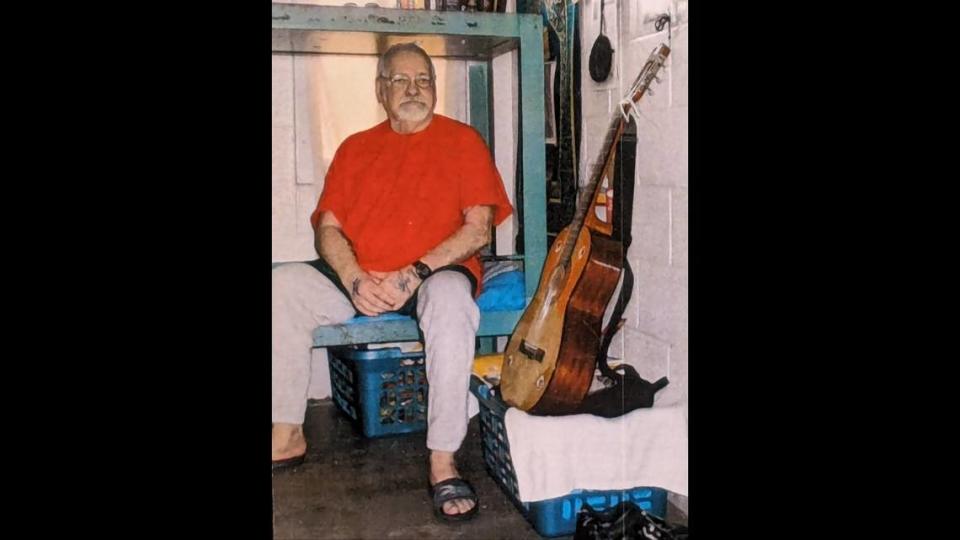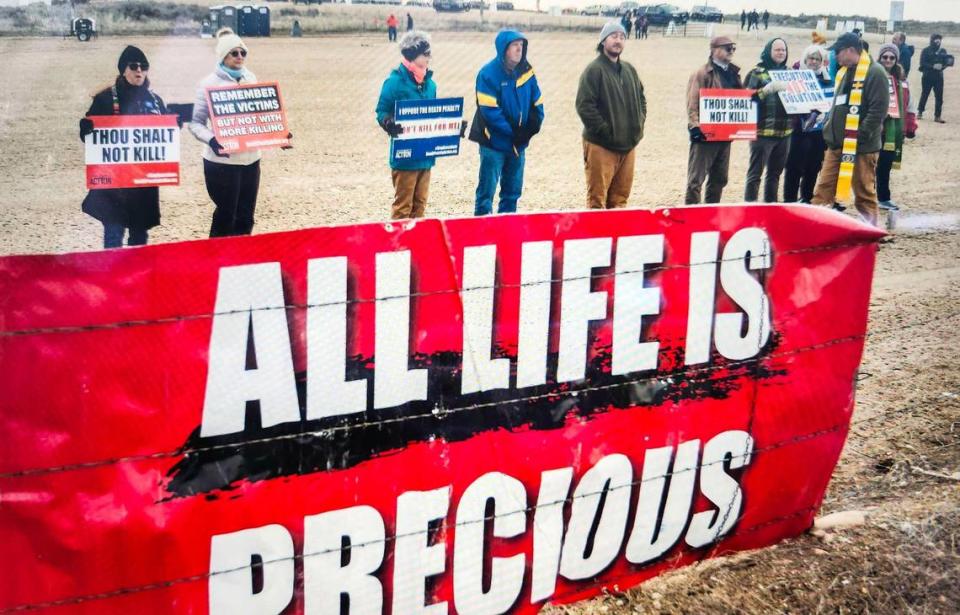Idaho failed to execute Thomas Creech by lethal injection. Could firing squad be next?
For the first time in state history, Idaho prison officials on Wednesday were unable to successfully carry out a lethal injection when members of the execution team could not locate a suitable vein to insert an IV into death row prisoner Thomas Creech.
Warden Tim Richardson conferred with Idaho Department of Correction Director Josh Tewalt about an hour into the attempted execution, after medical team members made eight tries in a variety of locations on Creech’s body. They started with his right arm and then his right hand, before moving to his left arm and then to his lower left leg, media witnesses stated.
Richardson then called off Creech’s execution. Tewalt said that Creech was returned to the cell where he’s been held for the past 30 days while he’s awaited his lethal injection, and that his death warrant would be allowed to lapse when it expires at the end of the day.
“From the very beginning, I’d rather be very candid and upfront that this is not a do-it-at-any-cost process,” Tewalt said at press conference. “Our first objective is to carry this out with dignity, professionalism and respect, and part of that was training and practicing for the chance that they were unable to establish IV access.”
And yet, those protocols do not have contingencies for such a circumstance, Tewalt acknowledged. As a result, what state officials might do next given the unprecedented situation in Idaho is unclear. Options will be discussed in the days ahead, Tewalt said.
Creech, 73, was convicted of five murders, including three in Idaho. He is Idaho’s longest-serving death row prisoner as part of nearly 50 years of incarceration in the state.

Idaho Attorney General Raúl Labrador and Ada County Prosecutor Jan Bennetts were driving forces behind the latest attempt to execute Creech — the 12th time he had been served with a death warrant since his first conviction in 1975.
Bennetts declined to comment to the Statesman. In an emailed statement, Labrador stated his disappointment in the “medical inability to execute” Creech.
“Justice has been delayed again,” Labrador said. “Today is a sad day for the families of his victims, and a continuation of the pain they have endured for almost five decades.”
Pricey lethal injection drugs rendered ‘unusable’
Ahead of Creech’s planned lethal injection, the execution team loaded the liquid pentobarbital it had on hand into syringes for use in the execution, Tewalt said. A purchase order obtained by the Idaho Statesman in a public records request revealed that prison officials paid $50,000 last fall for 15 grams of the drug, which has become harder to find in recent years as suppliers increasingly refuse to sell them to prisons for executions.
Idaho’s lethal injection protocol calls for a 5-gram lethal dose of pentobarbital to be split between two syringes. A backup 5-gram dose of the drugs also was prepared for Creech’s execution, Tewalt said.
In turn, the majority of the state’s stockpile of the pricey drug has been rendered “unusable,” he said. Ostensibly, that amounts to more than $33,000 in taxpayer dollars wasted.
A 5-gram dose remains, but a backup dose would still be required to conduct any future lethal injection execution, Tewalt said — be it Creech or one of Idaho’s seven other death row prisoners down the road.
In that case, prison officials would need to locate more of the drug for a lethal injection, Tewalt confirmed in response to a question from the Statesman.
“I’m not going to speculate on the chemicals for future executions,” he said. “I think we have a high level of confidence that we’ll be able to secure the chemicals necessary to carry out an execution by lethal injection. But we’ll cross that bridge when it comes.”
He declined to say whether IDOC could buy more pentobarbital from the same supplier as the most recent purchase. An Idaho law now allows prison officials to shield all identifying information about sources of execution drugs from disclosure through an exemption to public records.
‘Drugs from shady sources’
Creech’s attorneys with the legal nonprofit Federal Defender Services of Idaho immediately voiced anger at the morning’s developments, which they called a “botched execution.” In a statement, they also referenced the “state’s mysteriously acquired pentobarbital,” which they argued in an appeal denied by the U.S. Supreme Court on Wednesday morning could violate their client’s constitutional rights against cruel and unusual punishment because of preexisting health conditions.
“This is precisely the kind of mishap we warned the state and the courts could happen when attempting to execute one of the country’s oldest death-row inmates in circumstances completely shielded in secrecy despite a well-known history of getting drugs from shady sources,” Deborah A. Czuba, supervising attorney of the legal nonprofit’s unit that oversees death penalty cases, said in the statement.
Tewalt was one of two prison officials who boarded a state-chattered flight to Tacoma, Washington, to pay as much as $15,000 cash for lethal injection drugs from a compounding pharmacy in 2012, public records showed. The pentobarbital they brought back was then used in Idaho’s most recent execution in June 2012 of Richard Leavitt, who was convicted of a July 1984 murder in Blackfoot.
Creech’s attorneys have alleged in court filings that the Tacoma drug purchase was made in a Walmart parking lot. IDOC officials have denied the allegation.
Before that, prison officials in 2011 paid up to $10,000 in cash for lethal injection drugs to a compounding pharmacy in Salt Lake City, according to a sworn deposition from a former deputy prison chief, The Salt Lake Tribune reported. That pentobarbital was used to execute Paul Rhoades, who was convicted of three 1987 murders, in November 2011.
Compounding pharmacies are less regulated custom drug producers that aren’t closely monitored by the U.S. Food and Drug Administration. In each case, the out-of-state compounding pharmacy that sold pentobarbital to Idaho prison officials had dubious regulatory records.
On Wednesday, Tewalt said he’d respond in court to Creech’s attorneys’ claims of a botched execution attempt, and defended the decision to halt Creech’s execution.
“While the execution was unsuccessful, I think their efforts were,” he said of the execution team. “And I think it would be wrong to call it a failure. They did their level best in a professional way that was respectful of the process.”
Gov. Brad Little commended prison officials for doing “the right thing” by stopping Creech’s execution.
Robert Dunham, former executive director of the Death Penalty Information Center, told the Statesman in a phone interview that it appeared Idaho’s execution team “handled their job with professionalism.”
Idaho and the firing squad
Just last year, Little, with the backing of a supermajority of the Republican-dominated Idaho Legislature, signed a law that made a firing squad the state’s backup execution method when lethal injection drugs were unavailable. The state set aside $750,000 to renovate the execution chamber at the maximum security prison to provide a site for possible firing-squad executions, in addition to lethal injections.
Construction has yet to begin on the execution chamber overhaul, in part because contractors were unwilling to perform work on a project related to executions, Tewalt wrote staff in an email Wednesday afternoon. When that begins, it is expected that will prevent executions altogether until the work is finished, he said.
Tewalt told the Statesman that he couldn’t say whether Wednesday’s failed attempt to execute Creech might speed up plans to build out the execution chamber to accommodate a firing squad.
“There’s no timeline on it,” he said. “It’s premature for me to give you an answer to that. We’ll have discussions in the days ahead about next steps and try to make people aware … . But I just don’t have an answer today.”

In a statement, the American Civil Liberties Union of Idaho called on the state to drop all efforts to execute Creech and allow him to die of natural causes in prison.
“The failed execution of Thomas Creech calls attention to additional reasons why the government should not be in the business of executing people,” said Leo Morales, the ACLU of Idaho’s executive director. “The system is inhumane, cruel, traumatizing and ineffective, all while spending millions of dollars in a process that could have instead provided relief to murdered victim’s families. The ACLU of Idaho is against the death penalty in any situation, and today’s botched execution is just one additional reason.”


